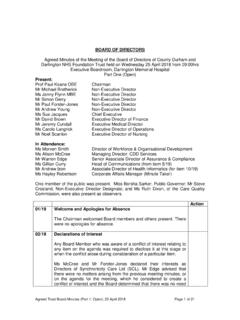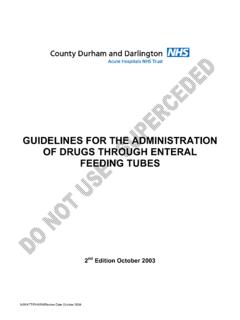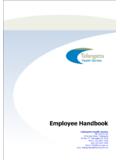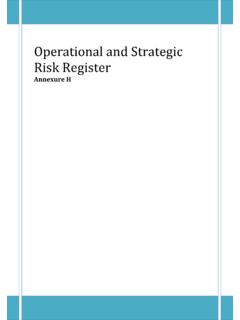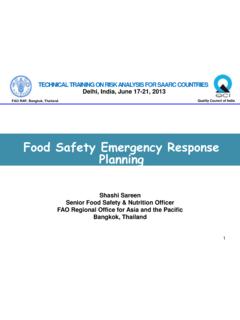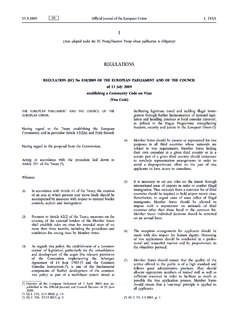Transcription of OPERATIONAL PROCEDURE DOCUMENT MAIN …
1 1 Jan 2004 UNIVERSITY HOSPITAL OF NORTH DURHAM OPERATIONAL PROCEDURE DOCUMENT main operating THEATRES 2 CONTENTS Page No 1. Introduction 4 2. Theatre Co-coordinator Role 5 a) Theatre Receptionist, main Duties and Responsibilities b) Theatre Reception Qualified Nurse, main Duties and Responsibilities c) Theatre Reception Auxiliary Nurse Duties and Responsibilities 3 Staff Rostering 7 a) Staff Rostering Policy b) On call guidelines c) Dedicated emergency theatre: staffing cover 4. Definition of operating session times 14 5. Protocol for change of theatre sessions 16 6. Theatre Bookings 18 a) Booking of patients for trauma and surgeon of week lists Booking of Emergency patients b) ERPC lists c) Emergency caesarean sections d) OPERATIONAL PROCEDURE for performing elective cardioversions in main recovery area 7.
2 Booking of theatre equipment, Image Intensifier and camera systems. 26 8. Areas within the operating department 27 1) Open access area 2) Restricted access area 3) main theatre reception area 9. Policy for visitors to the department 28 1) Nurses from ward areas 2) Nurses from ITU, A&E and Paediatrics 3) Professions allied to medicine 4) Parents and guardians 5) Company representatives 10. Staff entering and leaving the operating department 30 3 11. Transport policy 31 1) Basic principles 2) Priorities 3) Care of the patient during transfer to theatre 4) Transfer of patient from theatre to ward 5) Day case patient movements 6) Inpatient movements 12. Ordering and delivery of sterile supplies from the Central Sterile 35 Supplies Department 1) Ordering for routine planned lists 2) Special orders 3) Orders for sterile equipment for emergency surgery 4) Delivery of sterile supplies for CSSD 13.
3 Return of contaminated instruments, trays and equipment to CSSD 36 14. Disposal of clinical waste 37 15. Planned Preventative Maintenance 37 16. Deliver and collection of theatre clothing and other laundry 38 17. Ordering and delivery of medical and surgical supplies 39 18. Ordering, supply, storage, preparation and administration of drugs, IV 40 and irrigation fluids in the operating Department 1) Ordering and supply 2) PROCEDURE for checking controlled drug stocks 3) Custody and safe keeping of keys 4) Qualified ODPs and the handling of controlled drugs 5) Qualified ODPs and the administration of medicines 6) Preparation of drugs by ODPs 19. Collection of specimens. 44 20. Fire and evacuation policy.
4 45 21. Major Incident Policy 48 Appendix 1 Annual Leave Policy ( operating Theatre Staff) 54 Appendix 2 Guidelines for the management of an emergency session. 56 Appendix 3 Protocol for the sending of patients during elective lists 58 Appendix 4 Role of the Theatre Coordinator 60 4 1. INTRODUCTION The operating Department consists of 10 operating theatres each with its own dedicated anaesthetic room, scrub room and preparation room. Other facilities such as dirty utilities, storage rooms and exit bays are shared one between two theatres. The operating theatres will treat in-patients, day cases and outpatients for local and general anaesthetic procedures (both adults and paediatrics) across the following range of specialties general, vascular & colorectal surgery gynaecology orthopaedics oral surgery plastic surgery urology Elective waiting list, urgent and emergency cases will be operated upon.
5 When possible, urgent cases will be booked via the theatre computer system on to a daily trauma list with any potential or actual problems being referred to the Theatre Manager or deputy. Each consultant or specialty will follow the OPERATIONAL PROCEDURE for the booking of cases via the sapphire theatre computer system. Obstetrics Obstetric cases, including both planned and emergency caesarean sections will be undertaken in the dedicated Obstetric Theatre adjacent to the delivery suite within the maternity theatre. An emergency caesarean section will only be performed within the main theatre suite if the obstetric theatre on the Delivery Suite is in use and the mother and/or baby s condition is life threatening. Adjacencies The theatre complex is situated in close proximity to both the Surgical Day Unit and Intensive Therapy Unit. The Surgical Day Unit which includes changing facilities for patients together with second stage recovery rooms and interview rooms for pre-assessment and admission of day cases has its own OPERATIONAL PROCEDURE DOCUMENT which relates to these activities.
6 2. ROLE OF THEATRE CO-ORDINATOR 6 The role of Theatre Co-coordinator will be carried out on a 3 monthly rotational basis by all G grades, Monday Friday, 8am 5pm. The appropriate name will be displayed on the whiteboard at the reception area. The coordinator will carry the emergency bleep and list. Purpose of the role The main purpose of the role of Co-coordinator is to ensure maximum efficiency in terms of utilisation of theatre sessions and the deployment of staff. Booking of emergency and trauma patients All emergency and trauma or surgeon of week list patients must be booked with the Theatre Co-coordinator. The Theatre Co-coordinator will communicate with Consultant Surgeons and Anaesthetists to minimise delays and avoid problems. However there must be communication between the operating surgeon and the anaesthetist to communicate any patient problems.
7 Where difficulties remain, the Theatre Co-ordinator will liaise with the Clinical Director or Consultant Anaesthetist on duty/call and agree a decision which she/he will then communicate to those involved. Booking of Equipment All major pieces of theatre equipment required by Consultants, camera system or image intensifier must be booked with the Theatre Co-ordinator either in writing in the diary at reception or by telephone, giving as much notice as possible. Session Utilisation Anaesthetic Coordinator circulates available sessions to the Clinical Services Manager. (CSM) When it has been established that the Clinical Services Manager will use the session, the Theatre Manager/Coordinator advices if theatre staff are available. If theatre staff unavailable the following steps must be taken: Bank Staff Ask Day Surgery for staff Ask part-time staff to work extra Ask full-time staff for overtime Ask CSM for South Durham staff Agency Co-ordination of theatre and anaesthetic non-medical staff 7 The Theatre Coordinator will prepare duty rosters for the deployment of staff in the normal way.
8 The Theatre Co-ordinator will be responsible for the deployment of staff on a daily basis. (a) Theatre Receptionist The main duties and responsibilities of the Theatre Receptionist are to:- act as a switchboard for the theatres answer bleeps deposited by medical staff relay messages as appropriate Enter patients details on to the sapphire system undertake duties as detailed in specific theatre receptionist job description. undertake secretarial duties for Theatre Manager undertake typing duties for Theatre Sisters Facilitate access for Planned Preventative Maintenance (PPM) in the absence of the Reception Auxillary Nurse Coordinate maintenance of the Image Intensifier Produce trauma/surgeon of the week lists It is the responsibility of the medical secretary to ensure the typed list is delivered to theatre by 4pm the day before. If any delay may occur the Theatre Receptionist must be advised.
9 (b) Theatre Reception Nurse The main duties of the Theatre Reception Nurse are to:- send for patients from inpatient wards at the appropriate time to ensure there is no delay to theatre lists Check patients in to the operating department as per check list PROCEDURE protocol and to enter them on to the sapphire system Provide nursing care to patients waiting in the reception area when the ward nurse is unable to stay with the patient Inform the appropriate anaesthetic nurse when their patient is checked in and ready to enter the anaesthetic room To check with the theatre recovery sister to see if any patients can be returned to the same ward by the nurse escorting the patient to theatre reception To record base line observations To apply ECG electrodes (c) Theatre Reception Auxillary Nurse The main duties of the Reception Auxillary Nurse are to:- Greet visitors to the department, issue badges and maintain an up to date list of all visitors to the department.
10 8 Relay messages as appropriate Enter patient details onto the Theatre System when required Act as switchboard for Theatre Provide assistance to the reception nurse, remain with patient as directed Coordinate small works requirements in the department Facilitate access for Planned Preventative Maintenance. 3. STAFF ROSTERING (a) Staff Rostering Policy The Theatre Coordinator will prepare nursing and non-medical staff rosters. Rosters will be planned one month in advance whenever possible following the guidelines specified in the Trust Rostering Policy. Off duty requests Special off duty requests must be made in writing in the off duty request book prior to the planning of the duty roster for the relevant week. Booking holidays Holidays will be booked in accordance with the Annual Leave Policy (Appendix 1) (b) On-call guidelines Working time limit As an employer, the Trust is required to take all reasonable steps to ensure that its employees do not work more than an average of 48 hours per week over a reference period of 4 months (17 weeks).



